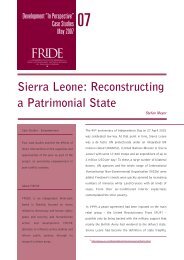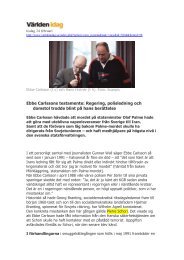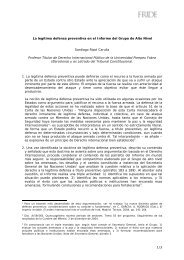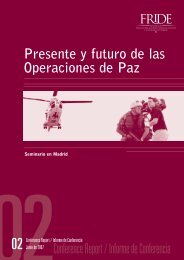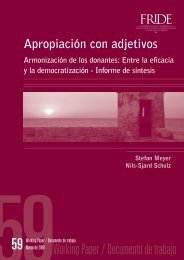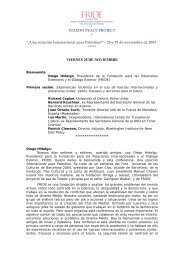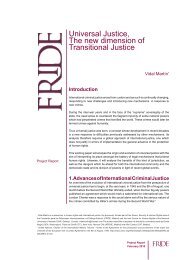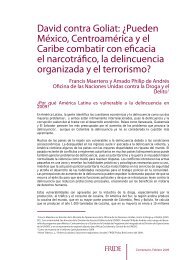Quick Fix or Quicksand? Implementing the EU Sahel Strategy - FRIDE
Quick Fix or Quicksand? Implementing the EU Sahel Strategy - FRIDE
Quick Fix or Quicksand? Implementing the EU Sahel Strategy - FRIDE
Create successful ePaper yourself
Turn your PDF publications into a flip-book with our unique Google optimized e-Paper software.
QUICK SHIFT OR QUICKSAND?<br />
13<br />
IMPLEMENTING THE <strong>EU</strong> SAHEL STRATEGY OLADIRAN BELLO<br />
and confident Algeria would have a very positive impact on <strong>the</strong> future of <strong>the</strong> N<strong>or</strong>th West<br />
African and broader West Mediterranean region. A key piece on <strong>the</strong> region’s chessboard, at<br />
<strong>the</strong> age of 50, Algeria can master its future. Yet, <strong>the</strong> question remains open: would Algeria<br />
dare?’ 36 Indeed, Algeria’s inconsistent positions on <strong>the</strong> Mali conflict have confounded many<br />
observers especially as <strong>the</strong> country’s broader interests are better served by a stable <strong>Sahel</strong>.<br />
As ECOWAS was w<strong>or</strong>king to secure <strong>the</strong> UNSC’s auth<strong>or</strong>isation f<strong>or</strong> <strong>the</strong> use of f<strong>or</strong>ce against<br />
Islamist groups in n<strong>or</strong><strong>the</strong>rn Mali, <strong>the</strong> Joint Military Staff Committee of <strong>the</strong> <strong>Sahel</strong> Region<br />
met in Mauritania on 11-12 July under Algerian leadership. The meeting ga<strong>the</strong>red military<br />
chiefs from Algeria, Mali, Mauritania and Niger. The declared aim of <strong>the</strong> meeting was to<br />
find a common solution to shared security problems in Mali and beyond, but it left out<br />
ECOWAS and o<strong>the</strong>r imp<strong>or</strong>tant diplomatic players like Senegal, Burkina Faso and Nigeria.<br />
Algeria also insists on <strong>the</strong> inclusion of all parties in diplomatic negotiations, including<br />
<strong>the</strong> Ansar Deen radicals led by Iyad Ag Ghali. 37 Yet, it is notable that under US pressure,<br />
Algeria appears to have been softening its stance as preparations f<strong>or</strong> international military<br />
action in Mali shift into top gear.<br />
3.2. Nigeria: sou<strong>the</strong>rn pivot<br />
The expansion of Boko Haram and <strong>the</strong> growing sophistication of its attacks have helped to<br />
crystallise <strong>the</strong> threats it poses not just to Nigeria itself but also to broader regional stability.<br />
Initially regarded as a wholly Nigerian phenomenon with little external connections, <strong>the</strong><br />
group’s involvement in combat operations in Mali has drawn Nigeria fur<strong>the</strong>r into eff<strong>or</strong>ts<br />
to stabilise Mali and <strong>the</strong> broader <strong>Sahel</strong>. 38 Until early 2012, <strong>EU</strong> officials insisted Abuja was<br />
not a <strong>Sahel</strong> power. 39 Evidence of BH’s growing involvement in Mali and Nigeria’s direct<br />
exposure to negative security spill-overs is gradually changing that outlook. F<strong>or</strong> Nigeria,<br />
Boko Haram’s involvement in <strong>the</strong> conquest of Gao in n<strong>or</strong><strong>the</strong>rn Mali by Islamist groups<br />
represented a serious escalation.<br />
Unlike Algeria, which has long pursued a successful strategy of confining AQIM to its<br />
sou<strong>the</strong>rn fringes and n<strong>or</strong><strong>the</strong>rn Mali, BH’s new found strategic depth in Mali and alliance<br />
with Al-Qaeda affiliated groups <strong>the</strong>re exposes much of n<strong>or</strong><strong>the</strong>rn Nigeria to an existential<br />
terr<strong>or</strong>ist threat. The country’s perceived lack of counter-terr<strong>or</strong>ism experience was evident<br />
in <strong>the</strong> disagreement with <strong>the</strong> US over proposals to classify BH as an international terr<strong>or</strong><br />
group. 40 To <strong>the</strong> extent possible, Nigeria seemingly prefers to keep responses to BH local,<br />
which in part explains its slowness to mobilise ECOWAS f<strong>or</strong> military action in Mali. As<br />
<strong>the</strong> regional anch<strong>or</strong> state on <strong>the</strong> sou<strong>the</strong>rn <strong>Sahel</strong> fringes, <strong>the</strong> case f<strong>or</strong> a m<strong>or</strong>e proactive <strong>EU</strong><br />
engagement with Nigeria on <strong>the</strong> <strong>Sahel</strong> <strong>Strategy</strong> could not be clearer. As Nigeria’s multiple<br />
conflicts gradually become overlaid by <strong>the</strong> Islamist insurgency in <strong>the</strong> n<strong>or</strong>th, prudence<br />
dictates that Abuja must become m<strong>or</strong>e centrally involved in <strong>EU</strong> eff<strong>or</strong>ts to contain transb<strong>or</strong>der<br />
instabilities and contagions from Mali. >>><br />
36. Francis Ghilès, ‘Algeria 1962-2012: m<strong>or</strong>e questions than answers’, Opinión CIDOB 154, 3 July 2012. Available at: http://www.cidob.<strong>or</strong>g/es/publicaciones/<br />
opinion/mediterraneo_y_<strong>or</strong>iente_medio/algeria_1962_2012_m<strong>or</strong>e_questions_than_answers<br />
37. Al Magharebia, 16 July 2012.<br />
38. Bef<strong>or</strong>e Mali, <strong>the</strong> only sign of Boko Haram’s possible international ambitions was <strong>the</strong> massive car bomb attack on UN headquarters in Nigeria’s capital,<br />
Abuja, in 2011.<br />
39. Interview with seni<strong>or</strong> <strong>EU</strong> official, 24 February 2012.<br />
40. ‘Boko Haram: Jonathan under fresh US pressure’, The Guardian (Nigeria) [Accessed on 29 July 2012].



